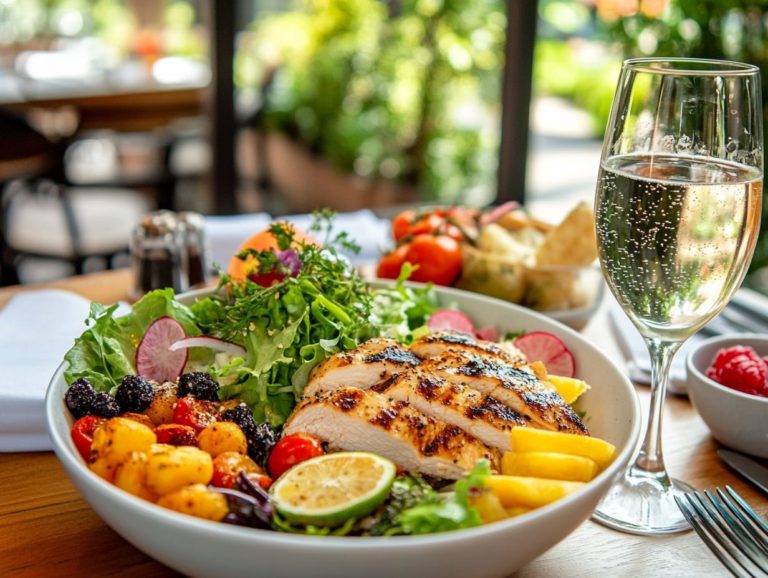How to Plan for Special Dietary Needs?
Navigating special dietary needs can be challenging. This can be true whether you re managing your own restrictions or helping a loved one.
This guide will equip you with insights ranging from understanding various dietary needs to practical meal planning tips that make life easier.
Delve into common dietary restrictions, discover suitable alternatives, and gather advice on handling social situations, like dining out with others.
We ll also touch on critical moments when seeking professional guidance becomes essential.
Join in as you embark on a journey to simplify and enhance the path toward healthier eating for everyone!
Contents
- Key Takeaways:
- Understanding Special Dietary Needs
- Identifying and Addressing Dietary Restrictions
- Planning Meals for Special Dietary Needs
- Navigating Social Situations
- Seeking Professional Guidance
- Supporting a Loved One with Special Dietary Needs
- Your Questions Answered About Dietary Needs
- What are special food needs?
- How can I determine if someone has special food needs?
- What steps should I take when planning for special food needs?
- How can I accommodate special food needs at events or gatherings?
- Are there any resources available to help with planning for special food needs?
- How can I make sure special food needs are met when dining out?
Key Takeaways:

Understand what special dietary needs are and how they can impact one’s physical and emotional well-being.
Identify and address dietary restrictions by researching alternatives and incorporating them into meal planning and preparation.
Navigating social situations can be challenging, but proper communication and planning can make dining out and special occasions more enjoyable for those with special dietary needs.
Understanding Special Dietary Needs
Understanding special dietary needs is essential in today s diverse food options. This is particularly important for event planners and catering services focused on ensuring attendee satisfaction.
These needs include food allergies, intolerances, and preferences like gluten-free, vegetarian, vegan, halal, and kosher diets.
By recognizing and addressing these requirements, you elevate the guest experience and promote health and well-being throughout your events.
What are Special Dietary Needs?
Special dietary needs include the specific needs you may have due to health conditions, personal preferences, or lifestyle choices. These often stem from food allergies or intolerances.
Needs might arise from conditions like celiac disease, which requires a strict gluten-free diet, or lactose intolerance, a condition that makes it hard to digest dairy.
Your choices, like vegetarianism or veganism, may reflect ethical considerations about animal welfare and environmental sustainability.
Your age, lifestyle, and activity level also shape your dietary needs.
By understanding these aspects, you can ensure you receive proper nutrition tailored to your circumstances, following dietary guidelines that promote health and well-being.
Identifying and Addressing Dietary Restrictions
Identifying and addressing dietary restrictions is essential for ensuring each attendee at your event feels included. This is particularly important for those with food allergies, intolerances, or dietary preferences.
By taking these considerations into account, you show a commitment to the well-being and satisfaction of all guests.
Common Restrictions and Alternatives
Common dietary restrictions include food allergies and intolerances. They also cover lifestyle choices like gluten-free, vegetarian, and vegan diets.
For example, individuals with gluten sensitivities can enjoy various grains like:
- Quinoa
- Brown rice
- Gluten-free pasta
Similarly, vegetarian attendees will appreciate protein-rich substitutes such as:
- Legumes
- Tofu
- Tempeh
This keeps everyone happy and healthy! For those on a vegan diet, include plant-based sources of calcium, like almond milk or fortified plant-based yogurts. Incorporate these alternatives into your menu to create an enjoyable and inclusive dining experience!
Planning Meals for Special Dietary Needs

Planning meals for special dietary needs is a crucial aspect of event planning that requires meticulous attention to detail.
You must thoughtfully select meal options that adhere to dietary guidelines and elevate the overall satisfaction of your attendees.
Start planning your next event with these tips today!
Tips for Meal Planning and Preparation
Effective meal planning and preparation for special dietary needs require a keen adherence to dietary guidelines. Ensure that your meals are nutrient-dense and tailored to the diverse requests of your guests.
First, gain a thorough understanding of each individual’s requirements, including allergies, intolerances, or personal preferences. Clear labeling of ingredients is essential to prevent mix-ups and foster transparency about what s being served.
Use color-coded labels to quickly identify gluten-free or vegan options, making it easy for everyone to make informed choices. Prioritize food safety through proper storage techniques and temperature control to avoid mixing different foods that can cause allergic reactions.
Incorporate a variety of flavors, textures, and colors. This enhances the visual appeal of your meals and guarantees balanced nutrition, ensuring that every guest feels satisfied and cared for.
Navigating social situations involving food can be challenging for those with special dietary needs. It requires careful consideration of dietary restrictions and meal preferences, especially when dining out or attending special occasions.
How to Handle Eating Out and Special Occasions
Dining out and attending special occasions with dietary restrictions becomes easier when you effectively communicate your needs and proactively choose meals to avoid allergenic ingredients.
Research restaurants in advance to assess menus and find venues that cater to your specific requirements. When you reach out to the staff, ask precise questions about how dishes are prepared and what allergens may be present. This ensures a safe and enjoyable dining experience.
When attending events, inform the host of your dietary preferences ahead of time. This allows them to accommodate your restrictions seamlessly.
Bringing along a snack or two can offer peace of mind, enabling you to enjoy social gatherings without the stress of food choices weighing on you.
Seeking Professional Guidance
When it comes to special dietary needs, seeking professional guidance from nutritionists or dietitians is crucial. They provide tailored dietary education and strategies designed specifically for you, ensuring that your unique requirements are met while supporting your health-conscious choices.
Investing in their expertise enables you to navigate your nutrition journey with confidence and clarity.
When to Consult a Nutritionist or Dietitian

Consult a nutritionist or dietitian when navigating complex dietary requirements or considering significant changes to your diet. These experts offer invaluable dietary education and customized meal planning that can make a significant difference.
If dealing with food allergies or intolerances, like gluten or lactose, they can suggest alternatives that meet your nutritional needs without compromising your health.
For those on weight loss journeys or managing chronic conditions such as diabetes and hypertension, their expertise is vital in crafting personalized strategies tailored to your lifestyle.
In these situations, a nutritionist becomes an essential ally. They simplify your choices, help you navigate food labels, and deepen your understanding of how food impacts your overall wellness.
Supporting a Loved One with Special Dietary Needs
Supporting a loved one with special dietary needs requires a nuanced understanding of their preferences and restrictions. Help them confidently navigate food choices, ensuring they feel included and valued during social gatherings and family meals.
By being attentive and proactive, you create an environment where they can thrive and enjoy shared experiences without feeling marginalized.
How to Be a Supportive Friend or Family Member
Being a supportive friend or family member to someone with special food needs means engaging in active communication and understanding their choices. It’s about ensuring that meal options are inclusive and accommodating.
To truly be an ally, it’s vital to educate yourself about these specific food needs, which can be due to allergies, personal preferences, or health reasons.
Open discussions can provide valuable insights into their preferences and restrictions, paving the way for better meal planning.
Involving them in culinary decisions fosters a sense of belonging and enables them to share their favorite recipes. By considering their needs in social settings like inviting them to parties or choosing restaurants you enhance their experience and strengthen your bond.
Your Questions Answered About Dietary Needs
What are special food needs?
Special food needs refer to specific dietary requirements or restrictions individuals may have due to medical conditions, allergies, personal beliefs, or cultural practices.
How can I determine if someone has special food needs?

It’s important to ask individuals if they have any dietary restrictions or allergies when planning meals. Don’t hesitate to ask a healthcare professional for guidance they can provide valuable insights!
What steps should I take when planning for special food needs?
First, gather information about the individual’s specific food requirements. Then, make a list of food items that are allowed and not allowed. Plan meals that meet those needs and ensure proper storage and preparation of the food.
How can I accommodate special food needs at events or gatherings?
When hosting events or gatherings, communicate with attendees beforehand to determine their food needs. Offer a variety of options and clearly label dishes to indicate ingredients and potential allergens.
Are there any resources available to help with planning for special food needs?
Yes! There are many resources available, such as dietary guidelines, recipe books, and online information that cater to specific food needs. You can also consult with a registered dietitian for personalized advice and support.
How can I make sure special food needs are met when dining out?
When dining out, communicate with the restaurant staff about any special food needs. They may be able to make accommodations or suggest suitable options from the menu. Researching restaurants that cater to specific food needs beforehand is also helpful.
Explore these resources today to better support your loved ones!




